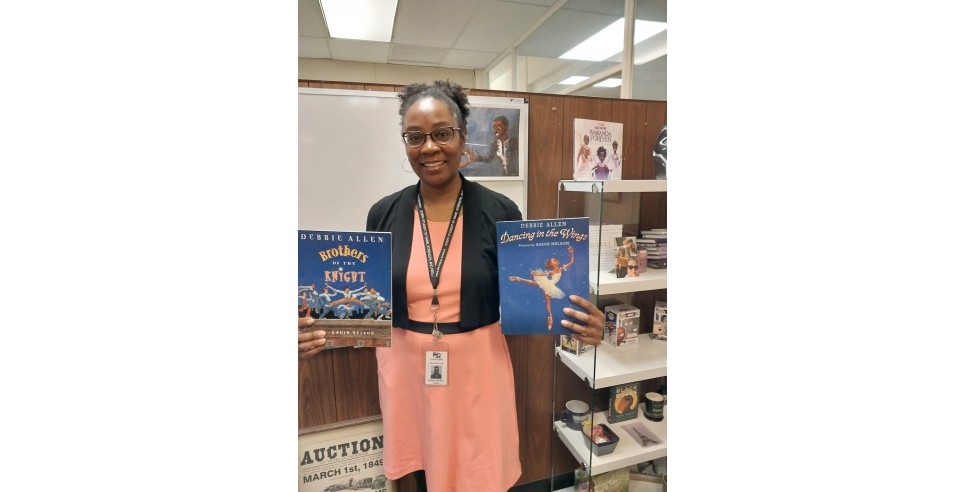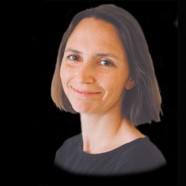
The first impression one might get of Tanisha Brandon-Felder, Ed.D, is that she has one of the warmest smiles of just about anyone, anywhere.
Yet as an educator and the host of a YouTube program called Talking Books with Tanisha, Brandon-Felder is also a fearless advocate for literacy and the freedom to read what you want, with a particular lens on books that affirm identity and reflect representation.
Even so, when this book-loving dynamo sat down for an interview recently to talk about her passion for books and literacy, she confessed, “I don’t remember learning how to read.”
That’s because her mother ensured that she was simply immersed in books from the get-go. As far back as Brandon-Felder can recall, books were a part of her life. “I always had a book in my hand, books in my bedroom, books on my nightstand.”
And every Saturday, she and her mother would go to the library to check out a bagful of books that Brandon-Felder would devour before the next week rolled around.
From the age of five, Brandon-Felder knew that she wanted to be a teacher. She created her first classroom (complete with chalkboard) in her bedroom, where she spent hours of playtime earnestly instructing her stuffed animals and dolls how to read from her own collection of books. A few years later, when the Scholastic book fair came to her school, she remembers the first book she ever bought for herself was Judy Blume’s “Tales of a Fourth Grade Nothing.” (Readers, take note: Judy Blume was one of the most banned authors of the 20th century – more on that, later.)
When Brandon-Felder got to high school, she took advantage of her school district’s four-year Teaching Academy program, designed for students who were interested in going into education as a profession. And when she went on to Grambling State University in Louisiana, she pursued a Bachelor’s degree in Elementary Education.
It was at Grambling, an historically Black public institution where she was surrounded by Black professors and other Black students, that Brandon-Felder said she affirmed her own Black identity. That further developed her sense of purpose. It was also at Grambling that Brandon-Felder met the man who would become her husband. After marrying, they settled in the Seattle area, where she earned a Master’s degree in Education at the University of Washington.
She taught in the Seattle School District for 16 years in a school located in one of the most diverse zip codes in the country. But the opportunity gaps for Black and Brown students were evident, so she returned to the UW to work toward her PhD in a program dedicated to helping educational leaders create more equitable educational policies and practices.
Brandon-Felder was hired as Director of Equity in a school district north of Seattle at a time when both that school district, and the city it operated in, were just beginning to think about what systemic DEI (Diversity-Equity-Inclusion) restructuring might look like. Drawing on all of her skills in facilitation, organization, conflict resolution, and community engagement, she helped to implement changes designed to serve a vast array of stakeholders. And tapping into the personal background that had always served her well, Brandon-Felder made sure that not only classrooms, but also school libraries, were enriched with more examples of cultural diversity.
Then COVID came along and schools closed down.
“I’m an introvert,” Brandon-Felder said, “but COVID was a lot for me.”
She turned to Facebook as a way of socializing, and made her first foray into video programming with a weekly Facebook check-in called “Turning Pages with Tanisha.” The first week, she talked about one of her favorite books from her high school days: “And Then There Were None,” by Agatha Christie. It was an unnerving title, given the pandemic, but Brandon-Felder’s urge to chat about books grew into an informal book club with giveaways and other fun features.
Then as the pandemic receded, and people began getting back to work, she started thinking about how to continue this program in a way that wouldn’t prove to be too heavy a lift.
“I was thinking about what I really wanted to talk about,” Brandon-Felder said. “I moved to a different platform. I wanted more structure, started thinking about themes, and crafting out seasons.”
The new, improved version of her program is called “Talking Books with Tanisha.” In her last season, she focused on banned books – perhaps that early Judy Blume book had something to do with it? But the political climate in recent years seem to be charged with a new brand of censorship – a report by PEN America, the writers’ advocacy group, notes that over the last full school year, the national trend toward banning books from classrooms and school libraries had escalated significantly, with the overwhelming number of book bans targeting stories by or about people of color or LGBTQ+ populations.
As far as Brandon-Felder is concerned, this will not stand. She frequently likens the function of books to “windows and mirrors” – windows to give readers insights into the different ways other people live, and mirrors to affirm – that word again – that a reader is not so alone or so different – that there are other people in the world who grapple with some of the same feelings, hopes, or fears.
At a time when youth suicide is at an all-time high, this is an important message to convey. And when there seems to be an inordinate level of divisive rhetoric not just in this country, but worldwide, the idea that stories can help us to consider other points of view and extend empathy toward others whose struggles may be different from our own is powerful medicine. In “Talking Books with Tanisha,” the host interviews librarians, teachers and authors about stories they’d like readers to be curious about, stereotypes they’d like to debunk, and how to build stamina for exploring the inequities that still bedevil the effort to form a more perfect union.
Brandon-Felder’s new season of Talking Books with Tanisha is scheduled to start up in June. In honor of her mother, who passed away earlier this year, this coming season will lift up some of the books that her mother held dear.
Barbara Lloyd McMichael is a freelance writer living in the Pacific Northwest.









